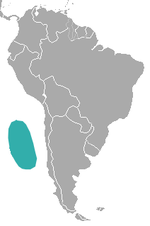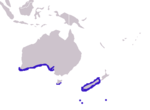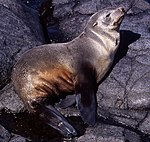Superregnum: Eukaryota
Cladus: Unikonta
Cladus: Opisthokonta
Cladus: Holozoa
Regnum: Animalia
Subregnum: Eumetazoa
Cladus: Bilateria
Cladus: Nephrozoa
Superphylum: Deuterostomia
Phylum: Chordata
Subphylum: Vertebrata
Infraphylum: Gnathostomata
Megaclassis: Osteichthyes
Cladus: Sarcopterygii
Cladus: Rhipidistia
Cladus: Tetrapodomorpha
Cladus: Eotetrapodiformes
Cladus: Elpistostegalia
Superclassis: Tetrapoda
Cladus: Reptiliomorpha
Cladus: Amniota
Cladus: Synapsida
Cladus: Eupelycosauria
Cladus: Sphenacodontia
Cladus: Sphenacodontoidea
Cladus: Therapsida
Cladus: Theriodontia
Subordo: Cynodontia
Infraordo: Eucynodontia
Cladus: Probainognathia
Cladus: Prozostrodontia
Cladus: Mammaliaformes
Classis: Mammalia
Subclassis: Trechnotheria
Infraclassis: Zatheria
Supercohors: Theria
Cohors: Eutheria
Infraclassis: Placentalia
Cladus: Boreoeutheria
Superordo: Laurasiatheria
Cladus: Ferae
Ordo: Carnivora
Subordo: Caniformia
Infraordo: Arctoidea
Cladus: Pan-Pinnipedia
Cladus: Pinnipedimorpha
Cladus: Pinnipediformes
Parvordo: Pinnipedia
Superfamilia: Otarioidea
Familia: Otariidae
Genus: Arctocephalus
Species: A. australis - A. forsteri - A. galapagoensis - A. gazella - A. philippii - A. pusillus - A. townsendi - A. tropicalis
Name
Arctocephalus E. Geoffroy Saint-Hilaire & F. Cuvier, 1826
Type species: "Phoca ursina" (= Phoca pusilla Schreber, 1775; not Phoca ursina Linnaeus, 1758) (International Commission on Zoological Nomenclature, 2000).
Synonyms
Arctophoca Peters, 1866
Euotaria Gray, 1866
Gypsophoca Gray, 1866
Halarctus Gill, 1866
References
Geoffroy Saint-Hilaire, É., and F. Cuvier, 1826. Phoque. Dictionnaie des Sciences Naturelles dan lequel on traite méthodiquement des différens ètres de la nature, considérés soit en eux-mèmes, d’après l’état actuel de nos connoissances, soit relativement, à l’utillité qu’en pruvent retires la médecine, l’agriculture, le commerce et les arts (F. Cuvier, ed.). F. G. Levrault, Strasberg; Le Normant, Paris, France 39: 554.
Peters, W. 1866. Uber die Ohrenrobben (Seelöwen and Seebären), Otaria, insbesondere über die in den Sammlungen zu Berlin befindlichen Arten. Monatsberichte der Königlichen Preussischen Akademie des Wissenschaften zu Berlin, 1866: 276.
Gray, J. E. 1866. Notes on the skulls of sea bears and sea lions (Otariidae) in the British Museum. Annals and Magazine of Natural History 18: 236.
Gill, T. 1866. Prodome of a monograph of the pinnipedes. Proceedings Essex Institute, Salem Communications, 5: 7.
Links
Arctocephalus in Mammal Species of the World.
Wilson, Don E. & Reeder, DeeAnn M. (Editors) 2005. Mammal Species of the World – A Taxonomic and Geographic Reference. Third edition. ISBN 0-8018-8221-4.
Arctocephalus É. Geoffroy Saint-Hilaire and F. Cuvier, 1826 – Taxon details on Integrated Taxonomic Information System (ITIS).
Vernacular names
The genus Arctocephalus consists of the southern fur seals. Arctocephalus translates to "bear head."
Taxonomy
The number of species within the genus has been questioned, primarily based on limited molecular data. The issue is complicated because some of the species are able to produce fertile hybrids. A recent review recommended the retention of seven species, deprecating the New Zealand fur seals to a subspecies of the South American fur seal, while also questioning the status of the Guadalupe fur seal.[2] Other recent studies have indicated the genus may be paraphyletic, and some taxonomic reshuffling was previously done to account for this; however, more recent studies support it being monophyletic, with the alleged paraphyly being a consequence of incomplete lineage sorting.[3][4]
Extant Species
| Image | Name | Distribution |
|---|---|---|
.jpg/150px-091130_rosita_bay_south_georgia_2563_(4172615911).jpg) |
Antarctic fur seal, A. gazella |  |
 |
Guadalupe fur seal, A. townsendi |  |
 |
Juan Fernández fur seal, A. philippii |  |
 |
Galápagos fur seal, A. galapagoensis |  |
.jpg/150px-Seals_at_Cape_Cross,_Namibia_(3046555706).jpg) |
Brown fur seal (or Cape fur seal), A. pusillus |  |
 |
New Zealand fur seal, A. forsteri |  |
 |
Subantarctic fur seal, A. tropicalis |  |
 |
South American fur seal, A. australis |  |
References
Wilson, D.E.; Reeder, D.M., eds. (2005). Mammal Species of the World: A Taxonomic and Geographic Reference (3rd ed.). Johns Hopkins University Press. ISBN 978-0-8018-8221-0. OCLC 62265494.
Berta, A.; Churchill, M. (2012). "Pinniped Taxonomy: evidence for species and subspecies". Mammal Review. 42 (3): 207–234. doi:10.1111/j.1365-2907.2011.00193.x.
Yonezawa, T.; et al. (2009). "The monophyletic origin of sea lions and fur seals (Carnivora; Otariidae) in the Southern Hemisphere". Gene. 441 (1–2): 89–99. doi:10.1016/j.gene.2009.01.022. PMID 19254754.
Lopes, Fernando; Oliveira, Larissa R; Kessler, Amanda; Beux, Yago; Crespo, Enrique; Cárdenas-Alayza, Susana; Majluf, Patricia; Sepúlveda, Maritza; Brownell, Robert L; Franco-Trecu, Valentina; Páez-Rosas, Diego (2020-12-26). "Phylogenomic Discordance in the Eared Seals is best explained by Incomplete Lineage Sorting following Explosive Radiation in the Southern Hemisphere". Systematic Biology. 70 (4): 786–802. doi:10.1093/sysbio/syaa099. ISSN 1063-5157.
Retrieved from "http://en.wikipedia.org/"
All text is available under the terms of the GNU Free Documentation License

